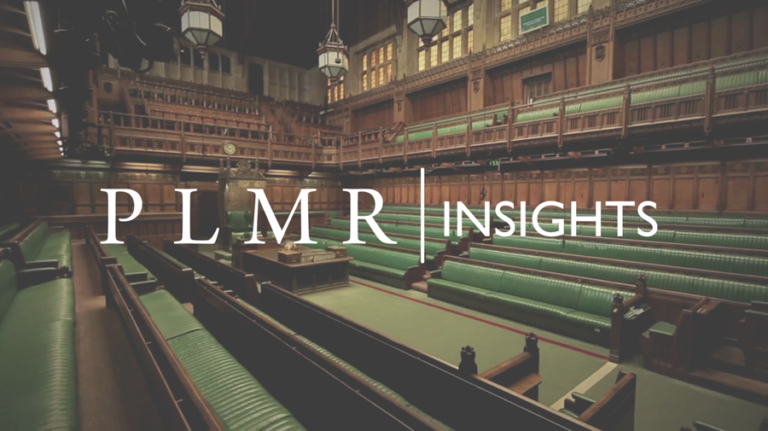After over a year of being consumed by the pandemic, the Queen’s Speech represents a chance for the Government to get back on track in terms of delivering on its manifesto promises dating back to 2019. The Prime Minister said that although the Government remains committed to tackling COVID-19, he is “also determined that we look forward and get on with fulfilling the promises we have made to the British people”. The newly announced legislative programme will focus on supporting the nation’s recovery from the pandemic but also on improving the NHS, “levelling up”, supporting jobs and businesses as well as spreading opportunity across the UK.
Levelling up featured heavily, with a whole series of bills dedicated to bringing this to life. This includes authorising the next stage of HS2, a flagship policy to better connect London to the North which continues to meet huge opposition over the expense involved. Other levelling up plans include extending 5G coverage, improving rail and bus links, establishing a post-Brexit state aid regime and creating eight new freeports. One of the centrepiece policies is the creation of a “lifetime skills guarantee” which will allow for flexible access to lifelong education and training. This is off the back of the Prime Ministers promise to bring about a “skills revolution” and designed to highlight that when the Government is talking about levelling up, it doesn’t just mean investing in infrastructure, but also addressing educational attainment and health inequalities across the country. From the Government’s perspective, this is also about getting people back to work, however Labour have criticised this, saying the Government should be prioritising the creation of good-quality jobs rather than on retraining people.
One of the more notable announcements was that the Government will take forward the Planning Bill, which is expected to be among the most controversial in the next session. It is designed to make the planning system “simpler, faster and more modern” but has encountered severe resistance from a range of Conservative MPs, including former Prime Minister Theresa May.
It will not be the only controversial legislation in the next Parliament as the Police and Crime Bill will also be taken forward. This is the bill that inspired hundreds of protests over fears that it would make it easier for the Government to stop demonstrations. There is also the Health and Care Bill which intends to reform the NHS. It has been met with a mixed reception but was notably criticised for giving Ministers more power over the NHS as a whole. In addition to this, plans to make voter ID mandatory are also expected to be met with fierce opposition not just from Labour and the other opposition parties, but again also from some Conservative backbenchers who have severe misgivings around any kind of mandatory ID.
However, there were certainly a number of crowd-pleasing bills in the speech for a range of audiences. This includes plans to finally ban conversion therapy, which the Government has been accused of delaying. These delays led to the Government’s LGBT advisory board being disbanded after resignations. Other bills that are likely to be relatively popular include three that will improve animal welfare laws as well as measures to tackle obesity. The Government is also clearly keen to refute criticism about its cutting of international aid and made sure to highlight that it will continue to provide aid where it has the greatest impact.
The Government also included bills containing measures that will please its traditional base, such as protecting freedom of speech in universities, strong action on the criminal networks that facilitate illegal immigration and keeping in check the power of the judiciary to get involved in the democratic process. The latter comes on the back of the Supreme Court ruling that the Prime Minister’s decision to prorogue Parliament in 2019 was illegal and is likely to be extremely controversial. And no doubt something that will significantly unnerve Labour, particularly following their overall performance in last week’s elections, the Government will repeal the Fixed Term Parliament Act, meaning the Prime Minister will have the power to call a General Election whenever he wants.
In his first speech as Prime Minister in 2019, Boris Johnson pledged to “fix” the social care crisis but since then little progress has been made. The opposition have fiercely criticised the Government for this, with Keir Starmer saying the Government has had 11 years to fix social care. The speech was expected to include details about social care reform, but this only featured in one vague sentence when the Queen confirmed that, “Proposals on social care reform will be brought forward”. This is unlikely to lessen pressure on the Government and Conservative backbench MPs are also getting annoyed about this, pointing to the negative optics of the Government having an 80 strong majority and still kicking the can down the road on this important issue.
Speaking on the media round this morning, Labour’s Shadow Foreign Secretary Lisa Nandy said that the Queen’s Speech had to be the moment that Conservative Governments “start to deliver for Britain”. The party have criticised the speech for its lack of detail on social care and warned that the proposed planning reforms only represent “tinkering” that will “not solve Britain’s housing crisis”.
Overall, this is a Queen’s Speech which reflects the changing nature of the Conservative Party and the direction of the Government as it seeks to hold on to the Red Wall seats it won in 2019. It contains sweeping promises for more investment and reform of the public sector as well as a number of populist policies designed to shore up its base of support among the working class. There were some hints of traditional Conservative orthodoxy in the speech, but they were few and far between. Only one vague sentence was devoted to economic stability, which pledged that the Government would ensure that the public finances are returned to a sustainable path once the economic recovery is secure. Once the party of tackling the deficit with a “long-term economic plan”, it is now clear that the leadership of the party is one that is comfortable with borrowing, spending, and investing. Where the rest of the party will fall remains to be seen. The challenge for the Government will be bringing together its newer MPs across the North and the Midlands – some of whom are in very marginal seats, represent a much broader voter base and want the Government to deliver the jobs and investment promised – and the more traditional Conservative base who favour a small-state, low-tax, less interventionist approach.
The Queen’s Speech debate will now take place in both Houses of Parliament over several days, with the Prime Minister and Leader of the Opposition to contribute after 2:30pm today.
You can read the full speech here.
You can read the full Queen’s Speech briefing paper here.
ANNOUNCEMENTS:
Health, care and beating Covid-19
· Health and Care Bill
The Health and Care Bill will include provisions to improve the oversight of how social care is commissioned and delivered. The government wants to ensure there is greater integration between health and care services by placing Integrated Care Systems “on a statutory footing across the UK”, so there is more power and autonomy in local systems. However, there is no commitment to reforming adult social care just yet, with the government saying reforms will be “brought forward to 2021”.
Aside from the bill, the Government has said additional NHS funding will be provided for the COVID-19 vaccination programme to continue and the government is promising to introduce legislation to “empower the NHS to innovate and embrace technology”. It will allow patients to receive “more tailored and preventative care, close to home”. Obesity and mental health will be two of the main focuses, with junk food adverts banned pre-watershed on TV – and entirely online. The government will then introduce legislation to require large food businesses to calorie label their food.
Jobs, economic recovery and infrastructure
· Skills and Post-16 Education Bill
The government will put forward this bill to “support a lifetime skills guarantee” that will enable access to “high quality education and training throughout people’s lives”.
· Advanced Research and Invention Agency Bill
The government is promising the “fastest ever increase” in public spending for research and development. An advanced research agency will be established if the bill is voted through and will bring forward plans to create and support jobs, as well as improve regulation.
· Planning Bill
The government wants to modernise the planning system so more homes can be built, and more people can own their own home. It also said it wants to enhance the rights of renters.
· High-Speed Rail (Crewe-Manchester) Bill
The government aims to strengthen the economic ties across the union, investing in and improving national infrastructure, where “proposals will be taken forward to transform connectivity by rail and bus.” The High-Speed Rail (Crewe-Manchester) bill will approve the delivery of the Crewe-Manchester HS2 line, seen as a key component to levelling up infrastructure.
· National Insurance Contributions Bill
Under this bill eight new Freeports will create hubs for trade and help regenerate communities under this Bill, providing the legal framework for eight new freeports. Initially these will be in Teesside, London Gateway, Liverpool City Region, Humber, Felixstowe, Southampton, Plymouth, and East Midlands Airport. Employers in freeports will get National Insurance contributions relief, which will also be introduced for employers of veterans and for the self-employed receiving NHS Test and Trace payments.
· Subsidy Control Bill
Measures will be introduced to ensure that support for businesses reflects the United Kingdom’s strategic interests and drives economic growth.
· Procurement Bill
The government wants to “simplify procurement in the public sector” by streamlining the more than 350 EU-derived regulations. It said the bill will make procurement quicker and easier and allow more freedom for suppliers and the public sector to work with the private sector.
· Professional Qualifications Bill
This bill will create a new framework for the UK to recognise professional qualifications from across the world, so that employers can access professionals where there are UK shortages.
· Product Security and Telecommunications Infrastructure Bill
This Bill will extend 5G mobile coverage and gigabit-capable broadband, protecting the UK from rogue actors by strengthening our tech and internet
Safety and Justice
· Police, Crime, Sentencing and Courts bill
This legislation will increase sentences for the most serious and violent offenders and ensure the timely administration of justice. It also aims to modernise court processes and reform the bail system.
· Draft Victims Bill
This Bill will be brought forward to address violence, including against women and girls. It will place a simplified and stronger set of rights for victims on a statutory footing, set out in the Victims’ Code.
As well as this bill, the government also said “measures” would also be brought forward to address racial and ethnic disparities and ban conversion therapy entirely, with new funding, expected by this summer, to support victims. This is apparently a personal priority for the Prime Minister.
· New Plan for Immigration Legislation
The Government will introduce plans for a “fairer immigration system,” attempting to deter criminals facilitating illegal journeys, and making it easier for the Government to remove “those with no right to be here.”
· Online Safety Bill
The government will “lead the way on internet safety for all, especially children, whilst harnessing the benefits of a free, open and secure internet.”
· Counter-State Threats Bill and Telecommunications (Security) Bill
The law will be introduced to counter hostile activity by foreign states and implement the Integrated Review of Security, Defence, Development and Foreign Policy.
· Armed Forces Bill
This will provide the Armed Forces with a significant spending increase as the Government pushes for modernisation of the Armed Forces and reinforce its NATO commitments. The bill will aim to strengthen the Armed Forces Covenant, placing it into law.
Fairness, inequality and opportunity
· Building Safety Bill
A new Building Safety Regulator law will be established to ensure tragedies like Grenfell “are never repeated”. “Rigorous” safety standards for construction products will be introduced and a “clearer path” to redress for homeowners.
· Leasehold Reform (Ground Rent) Bill
This will ensure leaseholders of new, long residential leases cannot be charged ground rent “for no tangible service”.
· Dormant Assets Bill
An additional £880 million of dormant assets will be released for social and environmental initiatives through this Bill.
· Charities Bill
The charities bill will seek to give more flexibility to charities and remove red tape and legal barriers to merging.
Environment and Animal Welfare
· Environment Bill
This will set binding environmental targets after the UK committed to achieving net zero greenhouse gas emissions by 2050 ahead of hosting COP26 in Glasgow this year. It will also set out commitments to restoring nature and biodiversity, tackling air pollution, cutting plastic use and will “revolutionise how we recycle”. New measures will be introduced to tackle sewage and protect waterways. An independent Office for Environmental Protection will be created.
· Animal Welfare (sentience) Bill
This will enshrine in law that animals are aware of their feelings and emotions, and can experience joy and pleasure, as well as pain and suffering. “Sentience” will apply to vertebrate animals.
· Kept Animals Bill
This bill will stop live animal exports and introduce a ban on families from keeping primates as pets.
· Animals Abroad Bill
This bill will ban the import of trophies from animal hunting.
Constitution, the Union and Global Britain
· Electoral Integrity Bill
This law will be introduced to ensure the integrity of elections through asking people to show identification, which is already required in Northern Ireland, at polling stations across the country. The government said in a briefing note that this would “give voters confidence that their vote is theirs, and theirs alone, by tackling electoral fraud”. The bill will also seek to “increase protection” on postal and proxy votes and to “strengthen” laws on “on intimidation and undue influence”.
· Higher Education (Freedom of Speech) Bill
This bill proposes to strengthen freedom of speech and academic freedom through a variety of measures including strengthening legal duties of universities to promote free speech and allowing individuals to seek legal redress.
· Judicial Review Bill
This will aim to protect the judiciary from being drawn into political debates and “preserve the integrity” of the judicial review process.
· Dissolution and Calling of Parliament Bill
The Bill will give the sitting Prime Minister the power to call a snap General Election whenever they want, after David Cameron’s Fixed Term Parliaments Act removed this power.
· Northern Ireland (ministers, elections and petitions of concerts) Bill
This aims to promote the strength and integrity of the union and include measures to strengthen the devolved government in Northern Ireland and address the legacy of the past. The first bill will give Northern Ireland’s devolved government more powers. Under the second bill, legislation will be introduced to address the legacy of the Troubles to deliver “better outcomes for victims and survivors”. It will end investigations into the past as part of the government’s commitment to veterans.




